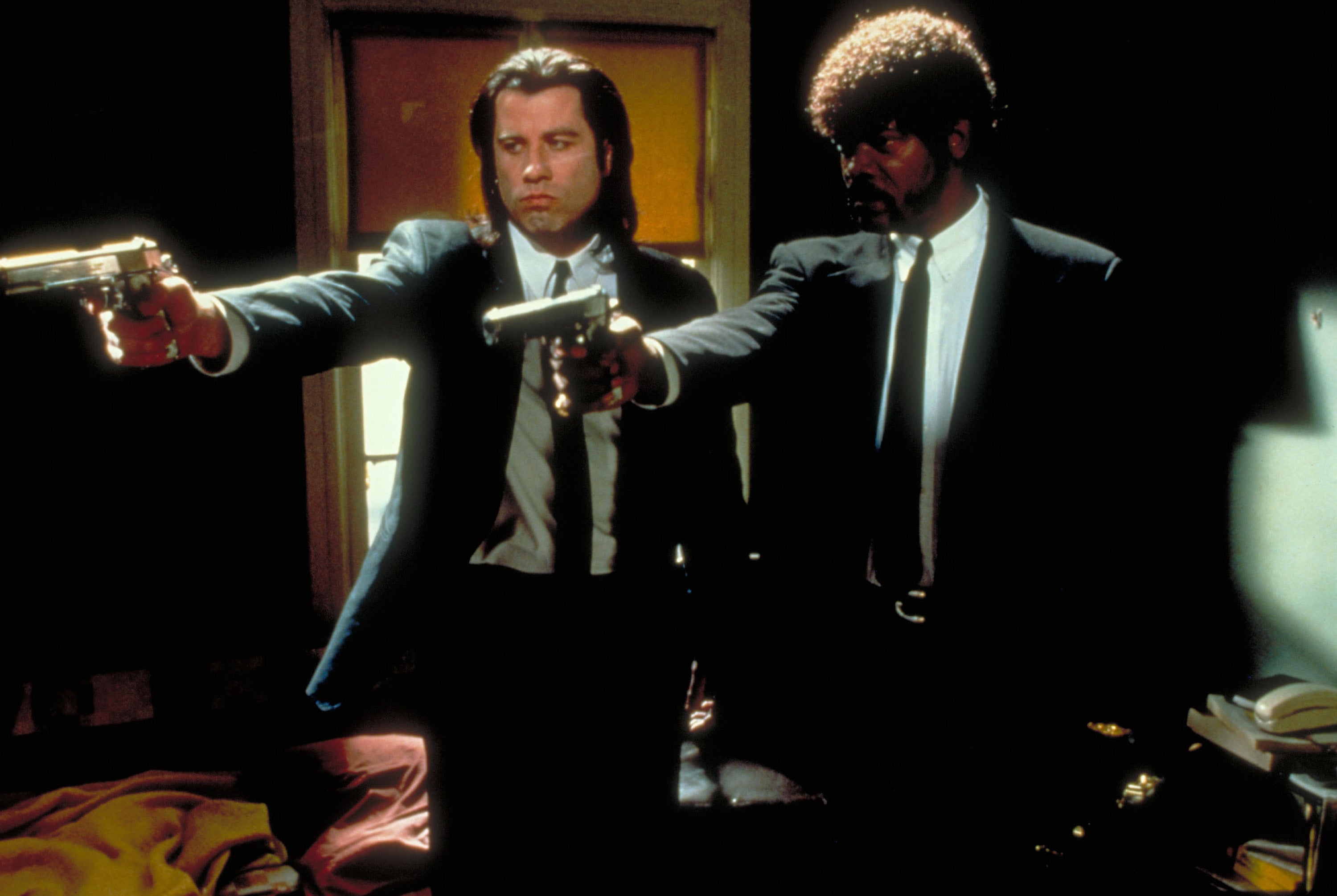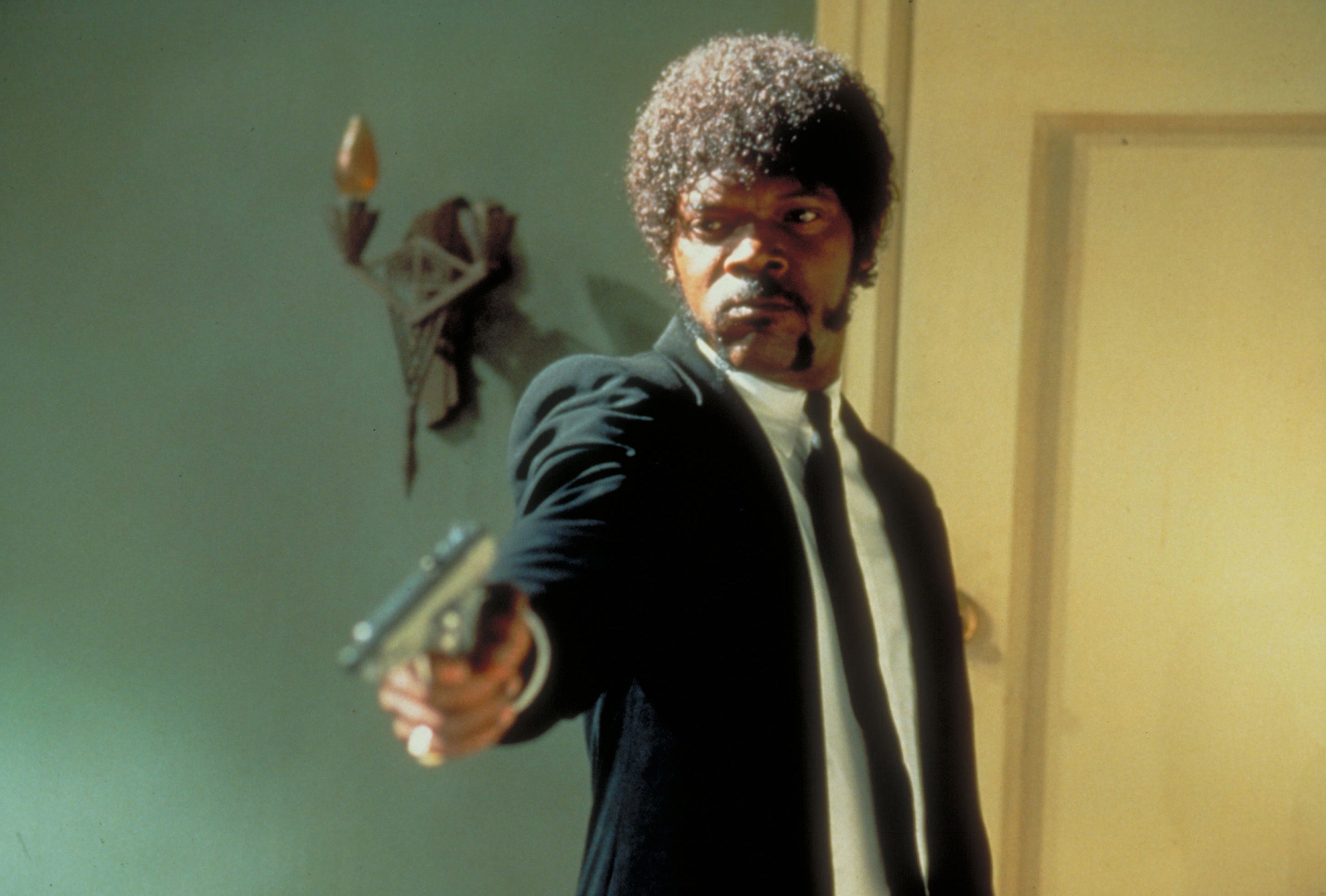At a Milwaukee breakfast event for evangelicals last week, Republican presidential candidate Donald Trump’s new running mate JD Vance suddenly started riffing about Quentin Tarantino’s 1994 classic Pulp Fiction.
The scene that made such an impression on the Ohio politician and author of Hillbilly Elegy is one of the bloodiest in the entire movie. Violent, bible-quoting gangster Jules (Samuel L Jackson), whom Vance calls “one of my favourite theologians”, has just shot a young crook. Out leaps another man, who has been hiding in the bathroom. “Die, you motherf***ers!” he yells, as he unloads three bullets in the direction of Jules and his partner Vincent (John Travolta). Somehow, the bullets all miss. Jules and Vincent raise their own guns in unison and kill the man. It’s at this point that Jules starts talking about “divine intervention”.
“We should be f***ing dead… that s*** wasn’t luck,” Jules says – a line strangely echoed in Trump’s remarks after surviving an assassination attempt earlier this month. (“I’m supposed to be dead!”) Bizarrely, Tarantino’s film, re-released in the UK next month to mark its 30th anniversary, has thus become part of the current US presidential election debate.
Then again, ever since its premiere at the 1994 Cannes Film Festival (where it won the Palme d’Or), the film has inspired near-religious devotion among huge swathes of fans worldwide. You’ll find Pulp Fiction references in everything from Ariana Grande videos to episodes of The Simpsons, but there has been nothing else quite like it, before or since. It isn’t surprising that Sight and Sound’s influential critics’ poll in 2022 ranked it among the greatest films ever made.
It’s 32 years now since the brash young writer-director started working on the script, longhand, in a one-room apartment in Amsterdam. The “hundreds of pages of indecipherable handwriting” Tarantino left the Netherlands with went on to form the basis of the movie that rescued Travolta’s career and turned Jackson from a jobbing character actor into a star. They are also credited with creating a hip and playful new subgenre of the gangster film. Pulp Fiction shocked and awed even the most jaded, hardbitten critics. Many reacted to its arrival as if it were the second coming. It was described variously as “exhilarating”, “crackling like an ozone generator”, and the “King Kong of crime movies”.
This is a deliberately lurid genre picture, and yet it has the complex narrative structure you’d expect to find in a dense modernist novel. It’s an anthology movie with three interlinked stories (on which the director worked with co-writer Roger Avary). The main characters are archetypes familiar from countless Hollywood B-movies – but are all given the familiar Tarantino spin. The wisecracking hitmen in their dark suits are his answer to the equally sleek angels of death played by Lee Marvin and Clu Gulager in Don Siegel’s The Killers (1964). The over-the-hill boxer Butch Coolidge (Bruce Willis) asked to throw a fight is a close cousin to Robert Ryan’s gnarled old has-been pugilist in Robert Wise’s The Set-Up (1949). Uma Thurman’s Mia, the wife of the gangster boss, is a 1990s version of film noir femme fatales like Rita Hayworth in Gilda (1946) or Ava Gardner in Robert Siodmak’s 1946 version of The Killers – but with a haircut modelled on Anna Karina in French New Wave movies of the early 1960s.
Tarantino brings lightness to the most fraught moments. A perfect example is Mia overdosing and being revived with an injection of adrenalin into her heart. As Travolta’s Vince and the shambling drug dealer Lance (Eric Stoltz) try to save her, Tarantino throws in slapstick and banter. The scene is at once terrifying and very funny – or “f***in’ trippy” as Lance’s wife Jody (Rosanna Arquette) aptly puts it. At the same time, he provides one of the most exhilarating dance sequences found in Nineties cinema – Travolta and Thurman doing the twist in Jack Rabbit Slim’s nightclub, to Chuck Berry’s “You Never Can Tell”.
“It was such a revolutionary and important project,” one of the film’s stars, Portuguese actor Maria de Medeiros, tells me of Pulp Fiction. “He disrespected completely all the screenwriting rules of Hollywood.” For a start, the film is full of dialogue. Conventional wisdom is that you should “show”, not “tell”, but Tarantino often privileges the words over the action. Then there is the approach to characterisation. Travolta’s character Vincent Vega is abruptly killed off midway through the movie – another of the writer-director’s near-heretical decisions (albeit one softened by the games Tarantino plays with chronology, jumping back and forth in time and thereby allowing Travolta to live on after his death).
Vincent may be as close as the film comes to a conventional hero, but he’s a drug-addicted killer. In one scene, he accidentally shoots petty criminal Marvin in the face. Marvin’s blood and brains explode all over the car. It is utterly grotesque, but Tarantino somehow plays the moment for laughs, as Jackson and Travolta, forced to clean the mess up, start bickering like a sitcom odd couple.
Tarantino was an extremely intelligent person, like a sponge, curious about everything
Actor Maria de Medeiros
Medeiros plays Fabienne, the gamine French girlfriend of the Bruce Willis character, who hides out with him in a motel room after he has killed his younger opponent in the ring. At the time when she appeared in Pulp Fiction, she was best known internationally for her role as author Anaïs Nin in the steamy Henry Miller biopic Henry & June (1990) – in which Pulp Fiction’s Thurman played Miller’s wife June. She had met Tarantino at a festival in Avignon where his debut feature Reservoir Dogs (1992) was screening. “I believe it was one of the first trips Tarantino had made to Europe, finding out about all the cultural differences – and those experiences, he put them in[to] the writing of Pulp Fiction,” she says – one notable example being the startling discovery that many Europeans prefer mayonnaise to ketchup on their French fries.
Medeiros found Tarantino “an extremely intelligent person, like a sponge, curious about everything”. To her surprise, he had watched Henry & June. His cultural tastes were far broader than his reputation as the king of grindhouse exploitation suggested. They met again at another festival in São Paulo, and she was later sent the Pulp Fiction screenplay. She realised immediately that it was “genius, really very, very special, very formidable. I thought to myself, ‘I would love to do this.’ The thing with Tarantino’s cinema is that it is very well written, like a theatre play. The actors don’t change a word. Everything is very precise. But also he is very spectacular, because he is hilariously funny and bright.”

Pulp Fiction was made for $8m, a very modest amount for a mainstream Hollywood studio picture. It went on to achieve an astonishing global box office haul of well over $200m. And yet Tarantino’s film has always inspired controversy as well as praise. One troubling issue today is the role played in its success by the boss of its distribution company, Miramax – Harvey Weinstein, now a disgraced and imprisoned sex offender.
“[Weinstein] was kind of like a father figure… a f***ed-up father figure,” Tarantino told podcaster Joe Rogan in a 2021 interview. He credited Weinstein with allowing him to keep the ear-cutting torture scene in Reservoir Dogs and (reluctantly) agreeing to the casting of Travolta as Vincent in Pulp Fiction at a time when the Saturday Night Fever star had been reduced to appearing in kids’ movies such as Look Who’s Talking. Tarantino was well aware of some aspects of Weinstein’s predatory behaviour, but told Rogan he didn’t know about any rapes, and had “chalked it up to the boss chasing the secretary around the desk”.
The content of the film was a separate source of debate. As the director made clear in his 2022 book Cinema Speculation as well as in his lengthy discussion with Rogan, he despises the self-censorship and political correctness he associates with 1980s American cinema, when all that mattered was that movie characters should be “likeable”. As a young man working in the Video Archives VHS rental store, he yearned for a far more outspoken and subversive approach to filmmaking – and that is what he provided in Reservoir Dogs and Pulp Fiction.
“We’re going through the Eighties part two right now, except there’s more of a McCarthyist blacklist to it than was in the Eighties,” he warned Rogan. This is a dangerous line for the director to tread. His detractors have accused him of promulgating misogyny, nihilism and random violence. “The authorial voice itself is startlingly coarse, sadistic even, when dealing with the female protagonists,” The Spectator wrote of his 2022 book version of Once Upon a Time in Hollywood. He has also been called out by Spike Lee and others for his “appropriation and exploitation” of Blackness – including the repeated use of racial slurs in his scripts.

The films themselves, though, have the kind of humour, ingenuity, and generosity of spirit that defies efforts to dismiss them as mean, racist or reactionary. Medeiros mentions the “delicacy” he brought to her scenes with Willis in Pulp Fiction. “It was also in the writing. The scenes of that couple talk about cultural shock – how two cultures that are very different from each other can fall in love with each other. She is so incredibly vulnerable and fragile in the hands of that boxer. The contrast makes it very beautiful.” She also refers to the “amicable, friendly and nice” working atmosphere that the director created. “That incredible freedom of expression he had is revolutionary, and is maybe the reason why, after 30 years, the film is still a cult film and a reference,” Medeiros says. “We were having such fun just listening to him and watching him.”
It’s strange, perhaps, that such an unusual, incendiary film would prove so lasting, whether with Republican senators or the public at large. But that’s Pulp Fiction for you. It’s a film that still satisfies like a “quarter-pounder with cheese” – then hits like a bullet to the gut.
The 30th anniversary 4K reissue of ‘Pulp Fiction’ arrives on 23 August

